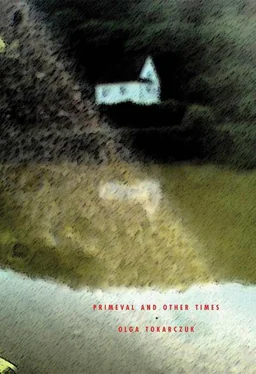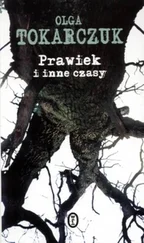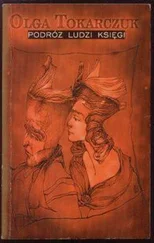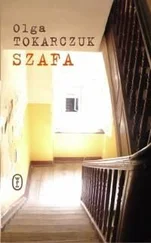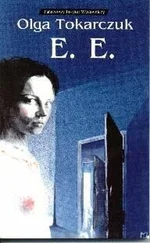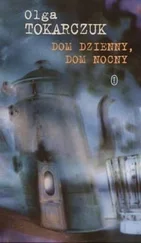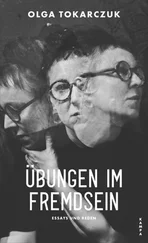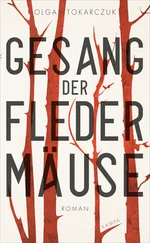She watched Ruta washing the floors, shredding large heads of cabbage, and grating cheese in a mixing bowl. And the longer she looked at her, the more certain she was. Sometimes, when they were doing the laundry or cleaning the house, and Michał was busy, Misia told the children to take Granny to the forest. The children took the chair outside carefully, and then, past the lilac, once they were no longer visible from the house, they raced down the Highway, pushing the chair that carried Genowefa’s stiff, majestic body. They would leave her, with windswept hair and a hand fallen helplessly over the armrest, while they ran into clearings looking for mushrooms or strawberries.
On one such day, from the corner of her eye Genowefa saw Cornspike coming out of the forest and onto the Highway. Genowefa could not move her head, so she waited. Cornspike came up to her and curiously walked right round the chair. She knelt down before Genowefa and peered into her face. For a while they eyed each other. Cornspike no longer resembled the girl who had walked through the snow barefoot. She had become stout and even bigger. Her thick plaits were white now.
“You switched my child for yours,” said Genowefa.
Cornspike burst out laughing and took her lifeless hand in her warm palm.
“You took the girl and left me the boy. Ruta is my daughter.”
“All young women are the daughters of older women. Anyway, you don’t need daughters or sons any more.”
“I’m paralysed. I can’t move.”
Cornspike raised Genowefa’s lifeless hand and kissed it.
“Get up and walk,” she said.
“No,” whispered Genowefa and, without feeling her own movement, shook her head.
Cornspike laughed and set off towards Primeval.
After this encounter Genowefa lost the desire to speak. She just said “yes” or “no.” One time she heard Paweł whispering to Misia that the paralysis was attacking her mind, too. “Let them think that,” she thought. “The paralysis is attacking my mind, but even so I still exist somewhere.”
After breakfast Michał took Genowefa outside. He set the chair on the grass by the fence, and sat down on a bench. He took out a cigarette paper and spent a long time crumbling tobacco in his fingers. Genowefa gazed ahead of her at the Highway, staring at the smooth cobblestones that looked like the tops of thousands of heads of people buried in the ground.
“Aren’t you cold?” asked Michał.
She shook her head.
Then Michał finished his cigarette and walked away. Genowefa remained in her chair, gazing at Mrs Papuga’s garden, at the sandy field road that wound its way between splashes of green and yellow. Then she looked at her own feet, knees, hips – they were just as far away and just as much not part of her as the sand, fields, and gardens. Her body was a broken figurine made of fragile human material.
She was surprised she could still move her fingers, that she still had feeling in the tips of her pale hands, which had known no work for months. She laid those hands on her insensible knees and fumbled with the folds of her skirt. “I am a body,” she said to herself. And in Genowefa’s body, like cancer, like mould, the image of killing people was growing. Killing involves taking away the right to move, as after all, life is motion. A killed body has stopped moving. A person is a body. And everything a person experiences has its beginning and end in the body.
One day Genowefa said to Michał:
“I feel cold.”
He brought her a woollen shawl and gloves. She moved her fingers, but she couldn’t feel them any more, so she didn’t know if they were moving or not. When she looked up at the Highway, she saw the dead returning. They were heading down the Highway from Czernica to Jeszkotle in a large procession, like the pilgrimage to Częstochowa. But pilgrimages always involve a hubbub, monotonous songs, mournful litanies, and boot-soles shuffling over the stones. Here silence reigned.
There were thousands of them. They were marching in uneven, broken ranks. They walked in icy silence, at a rapid pace. They were grey, as if deprived of blood.
Genowefa sought Eli among them and the Szenberts’ daughter with the baby in her arms, but the dead were moving too fast for her to look at them closely. Only later did she see the Serafins’ son, and that was only because he was walking nearest to her. He had a huge, brown hole in his forehead.
“Franek,” she whispered.
He turned his head and, without slowing his pace, glanced at her. He stretched out a hand to her. His lips were moving, but Genowefa couldn’t hear any words.
She saw them all day, until evening, and the procession did not dwindle. They still went gliding past when she closed her eyes. She knew God was watching them, too. She could see His face – it was black, terrible, covered in scars.
THE TIME OF SQUIRE POPIELSKI
In 1946 Squire Popielski was still living in the manor house, though everyone knew it wouldn’t last much longer. His wife had taken the children to Kraków and was now to-ing and fro-ing, getting ready to move out.
The squire didn’t seem to care what was going on around him. He was playing the Game. He spent days and nights in the library. He slept on a couch. He didn’t change his clothes or shave. When his wife went off to the children, he didn’t eat, sometimes for three or four days. He didn’t open the windows, he didn’t speak, he didn’t go for walks, he didn’t even go downstairs. Once or twice people from the district administration came to see him about the nationalisation. They had briefcases full of writs and official stamps. They banged on the door and pulled at the bell. Then he went up to the window, looked at them from above, and rubbed his hands.
“It all fits,” he said in a hoarse voice unaccustomed to speaking. “I’m moving onto the next square.”
Sometimes Squire Popielski needed his books.
The Game required him to find various bits of information, but he had no trouble with that – he could find it all in his own library. As dreams played a crucial role in the Game, Squire Popielski taught himself to dream to order. More than that, he gradually gained control of his dreams, doing in them what he wanted, completely differently from in life. He consciously dreamed on the prescribed topic, and at once just as consciously awoke on the other side, as if he had gone through a hole in the fence. It took him a while to come to his senses, and then he began to act.
And so the Game gave him everything he needed, and even more. Why should he have to leave the library?
Meanwhile, the officials from the district administration took away his forests, clearings, arable land, ponds, and meadows. They sent a letter in which he was informed, as a citizen of the young socialist state, that the brickworks, sawmill, distillery, and water mill no longer belonged to him. Nor in the end did the manor house. They were polite, they even set out a deadline for handing over his property. First his wife cried, then she prayed, and finally she began to pack their things. She looked like a votive candle, she was so thin and wax-pale. Suddenly gone white, her hair shone in the gloom of the manor house with a cold, equally pale light.
Squire Popielski’s wife bore no grudge against her husband for going mad. She was worried that she would have to decide on her own what could be taken and what left behind. When the first vehicle drove up, however, Squire Popielski, pale and unshaven, came downstairs with two suitcases in his hands. He refused to show what he had in them.
His wife ran upstairs and spent a while scanning the library with a keen eye. She did not think anything was missing. There were no empty spaces on the shelves, not a single painting or ornament had been moved, nothing. She summoned the removal men, and they threw the books into cardboard boxes any old how. Then, to be quicker, they started scooping them off the shelves in entire rows. The books spread their flightless wings and torpidly fell in a heap. When they ran out of boxes, they left it at that, took the full boxes and went. Only later did it turn out that they had taken everything from A to L.
Читать дальше
